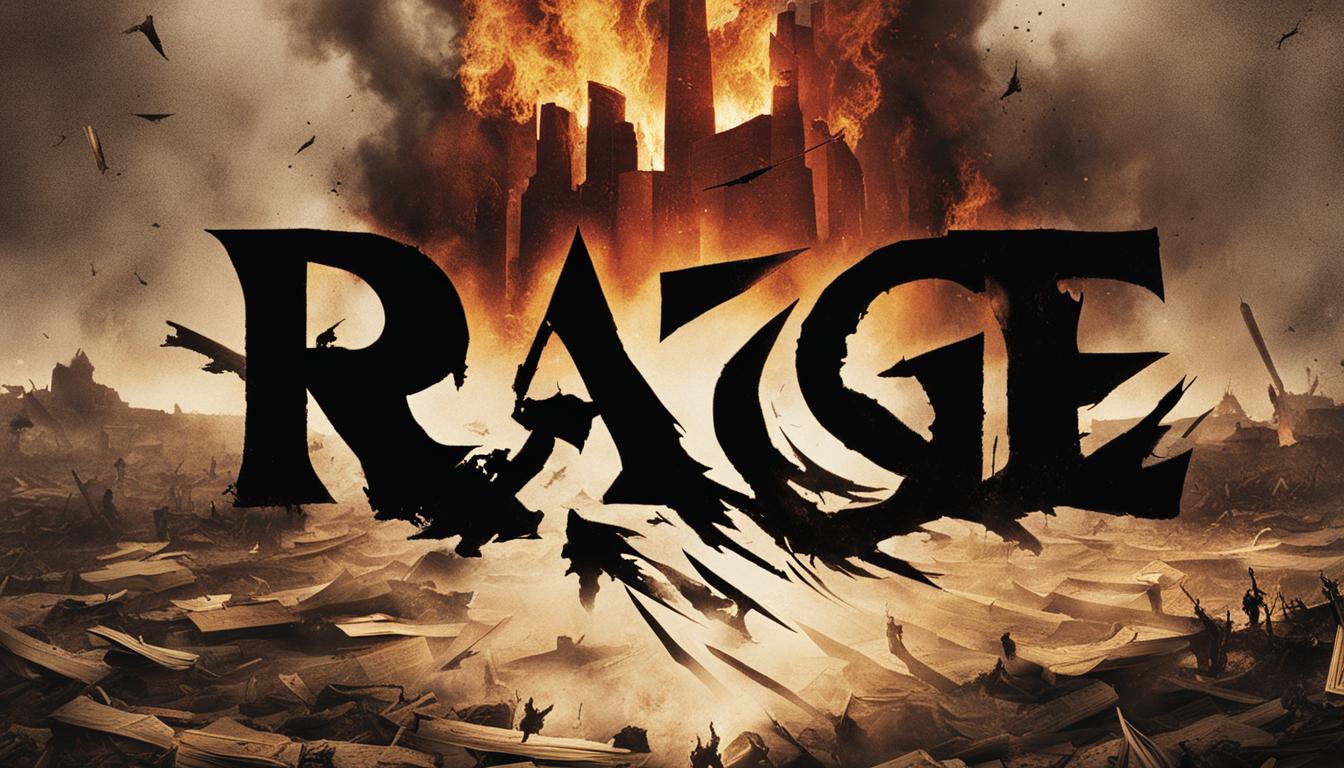Welcome to our in-depth analysis of Stephen King’s “Rage,” a novel that has sparked intense debates and controversy. As one of King’s earlier works, the book has faced criticism and censorship, making it a significant topic for discussion and exploration.
In this section, we will delve into the background of Stephen King and the controversial nature of his novel “Rage.” We will examine the plot of the story, the controversies surrounding it, and the societal impact of its censorship. Furthermore, we will explore King’s response to the controversy and the lasting impact of the novel on his career and the literary world.
Join us as we examine “Rage” by Stephen King in detail to uncover the complicated and controversial issues it raises. To start, let’s take a closer look at why this novel has sparked such intense debates and faced removal from bookshelves.
The Background of Stephen King’s “Rage”
Stephen King is a renowned American author known for his contributions to the horror and suspense genres. His novel “Rage,” originally written under the pseudonym Richard Bachman, was published in 1977. The novel explores the themes of adolescent alienation and violence in schools.
“Rage” is one of King’s earliest novels, and its publication sparked significant controversy due to its portrayal of a school shooting. The novel was later removed from bookshelves by King himself in 1997, following a series of school shooters who cited “Rage” as inspiration for their actions.
The background of Stephen King’s “Rage” is crucial to understanding the cultural and historical context in which it was written and published. Through exploring the themes and controversies surrounding its publication, we can gain a deeper appreciation for King’s contributions to the literary world.
Plot Summary of “Rage”
Stephen King’s “Rage” begins with protagonist Charlie Decker, a high school senior, bringing a handgun to school, promptly shooting his algebra teacher, and taking his class hostage. As the novel unfolds, other students share their personal struggles with Charlie, revealing him to be a troubled and deeply disturbed young man.
The novel takes place in a fictional suburb of Chicago, and its themes center around the struggles and turmoils of adolescence. “Rage” explores the difficulties of growing up in a complex world, where violence and confusion seem to be the norm.
The story is full of tension, as Charlie and his classmates struggle against both each other and the outside world. As the situation at the school escalates, Charlie’s motivations are revealed, including his troubled family life, his struggles with mental illness, and his desire for revenge against those he feels have wronged him.
“Rage” is a gripping, intense novel that keeps the reader on the edge of their seat from start to finish. As events spiral out of control, it quickly becomes clear that things will not end well for anyone involved in the hostage situation. Stephen King expertly weaves together themes of love, loss, and violence in this haunting and disturbing tale.
Controversies Surrounding “Rage”
Stephen King’s “Rage” stirred up controversies that sparked intense debates, particularly on its impact on readers. Critics argued that the novel, which narrates a high school student’s shooting spree, glorified violence and could incite similar crimes. This led to the book’s removal from shelves in some regions.
Despite the negative feedback, some readers praised the novel for its truthful portrayal of teenage life and its realistic depiction of how young adults may exhibit pent-up anger and frustration. Some also defended King, stating that the book should be read as a work of fiction and not be regarded as an endorsement of the violence portrayed.
King himself responded to the debates regarding his novel. He acknowledged the potential negative influences his work could have on impressionable readers but argued that removing the book from circulation was not the solution to the problem of gun violence.
Despite its controversies, “Rage” remains an iconic work in Stephen King’s oeuvre, more so for the controversies it generated than the actual content of the book. The debates around the novel reflect the larger societal issues surrounding gun violence and the public’s perception of art’s role in the depiction of such violence.
Societal Impact and Censorship of “Rage”
Stephen King’s “Rage” not only sparked intense debates but also faced significant censorship due to its controversial content. The novel’s portrayal of teenage violence and its impact on society raised concerns, leading to its removal from bookshelves.
The censorship of “Rage” had significant implications for freedom of expression. The decision to remove the book from schools and libraries was met with criticism from those who believed in the importance of open discourse and the dangers of censorship.
The societal impact of “Rage” cannot be understated. The controversy surrounding its publication and subsequent censorship triggered discussions about the responsibility of authors and publishers in producing and distributing challenging works that tackle difficult topics.
The legacy of “Rage” has continued to be felt to this day in the literary world, with many questioning whether the censorship it faced was necessary or justified. Its societal impact also reinforces the power of literature to spark conversations and provoke thought on difficult topics.
Author’s Response to the Controversy
Following the controversy surrounding “Rage,” author Stephen King offered a response to the criticisms and debates surrounding his book. He acknowledged the intense reactions to the content of the novel and the concerns that it may influence violent behavior.
King defended his intentions as an author, stating his belief in the importance of exploring difficult and uncomfortable topics through literature. He argued that by confronting these issues, readers can gain a greater understanding of themselves and the world around them.
In response to the calls for censorship, King expressed his opposition to the idea of banning books, stating that it is not the role of authorities to dictate what people can and cannot read. He emphasized the importance of freedom of expression and the right to explore controversial and challenging topics through literature.
Legacy and Influence of “Rage”
Stephen King’s “Rage” left a lasting imprint on the literary world, shaping the direction of the author’s career and influencing later works in the genre. The controversial novel sparked debates on the societal impact of literature and the role of censorship in expressing creative freedom.
Influence on the Author’s Career
“Rage” marked a shift in Stephen King’s writing career, cementing his reputation as a provocative and boundary-pushing author. The success of the book allowed him to push creative boundaries in subsequent works, exploring taboo subjects and pushing the limits of what was deemed permissible in literature.
Influence on the Genre
The influence of “Rage” extended beyond the author’s career, shaping the direction of the horror genre as a whole. The novel challenged societal norms and sparked discussions on the psychology of violence, themes that continue to be prevalent in contemporary horror works.
Continued Relevance
Despite its initial publication over four decades ago, “Rage” remains a relevant work in today’s literary landscape. The impact of the novel can be seen in the continued debates on censorship, creative freedom, and the societal responsibility of authors.

The legacy of “Rage” is a testament to the power of literature to provoke thought and inspire change, even in the face of controversy. Its influence on the genre and on the literary world as a whole will continue to be felt for years to come.
Conclusion: Reflecting on “Rage” by Stephen King
Stephen King’s “Rage” will forever be remembered as a controversial novel that sparked intense debates and ultimately faced removal from bookshelves. It is a book that explores provocative themes and challenges societal norms, making it a significant piece of literary history.
Despite the controversies that surrounded it, “Rage” remains a testament to Stephen King’s skill as a writer. Through his writing, he was able to capture the minds and hearts of readers, pushing the boundaries of what was acceptable in society at the time.
Today, we reflect on the lasting impact of “Rage” and how it continues to influence literary works. Its legacy as a controversial piece of literature has inspired others to explore provocative themes and challenge societal norms in their own writing.
As we conclude our analysis of “Rage,” we reflect on the significance of Stephen King’s contribution to the literary world. His writings will continue to inspire and provoke thought, and “Rage” will forever be remembered as a testament to his talent as a writer.



